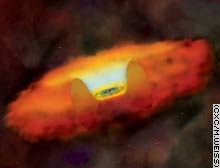


In an artical in news @ nature. com back in 2004, The eminent physicist Stephen Hawking has conceded that information can escape from black holes after all. The idea has been gaining popularity with physicists for some time, but the fact that Hawking, a pioneer of black-hole theory in the 1970s, has finally accepted it is something of a watershed.
Hawking had believed that anything swallowed by a black hole was forever hidden from the outside universe. A freind of Hawking- John Preskill bet that the information carried by an object was not destroyed when it plummeted into a collapsed star, and could actually be recovered.
Hawking's original view follows Einstein's general theory of relativity, which predicts that, at certain locations in space, matter collapses into an infinitely small and dense point, called a singularity. The theory says that the force of gravity at this point is so great that nothing, not even light itself, can escape, hence the term 'black hole'.

Because the singularity is infinitely small, it cannot possibly have any structure and so there is no way that it can hold information. Any data about particles entering the black hole must be lost forever.
The problem is that quantum theory, which describes space and matter on very tiny scales, contradicts this. Quantum theory says any process can be run in reverse, so starting conditions can theoretically be inferred from the end products alone. This implies that a black hole must somehow store information about the items that fell into it.
So an object falling into a black hole is not completely obliterated. Instead, the black hole is altered as it absorbs the object. Although it would certainly be very difficult to retrieve any information about that object, the data are still there, somewhere inside the black hole.
How could that information ever escape? The answer lies in one of Hawking's greatest discoveries: that black holes slowly evaporate into space by losing particles from the very edge of the gravitational precipice at their rim, called Hawking radiation. The black hole eventually shrinks to a tiny kernel, at which point a growing torrent of radiation begins to leak out, potentially carrying the lost information with it.
No comments:
Post a Comment